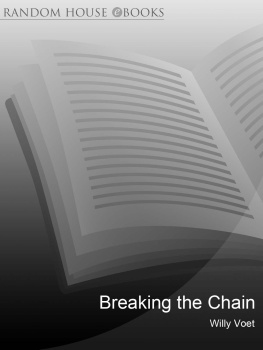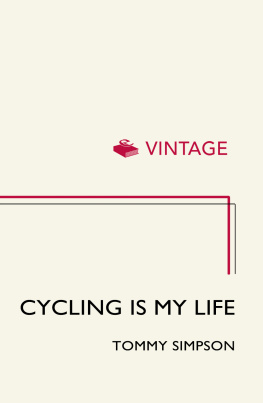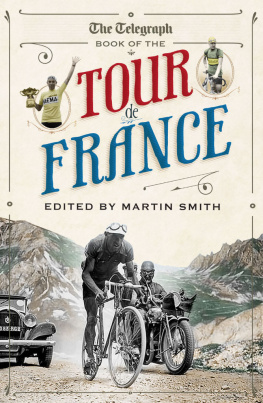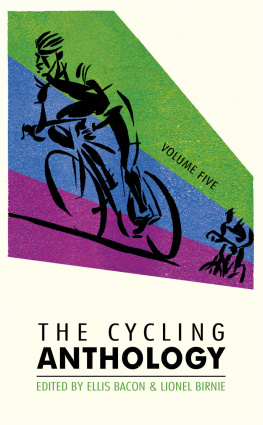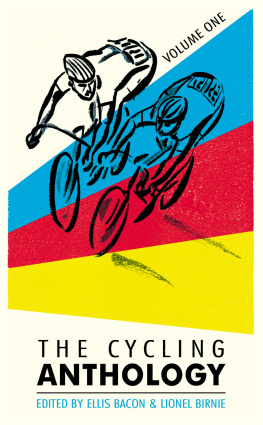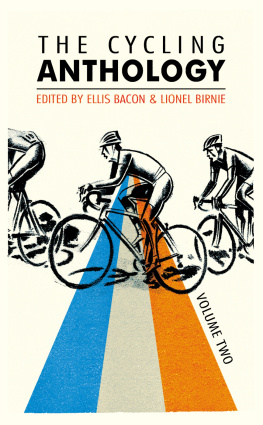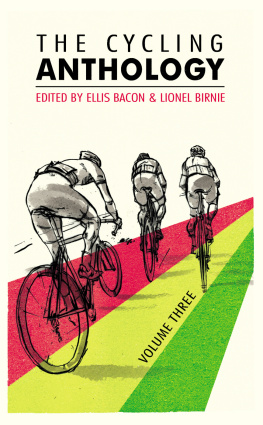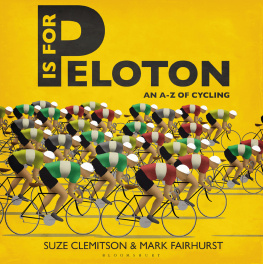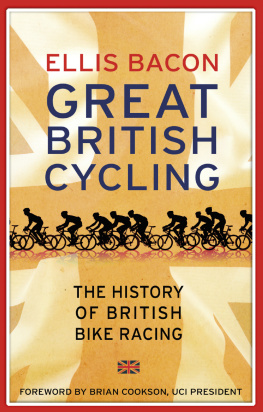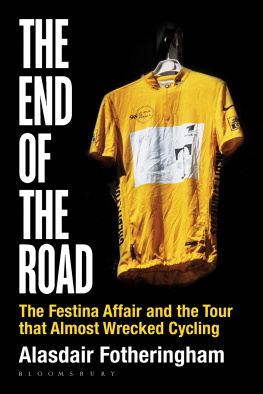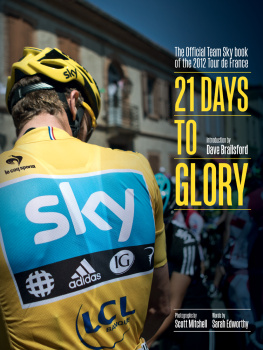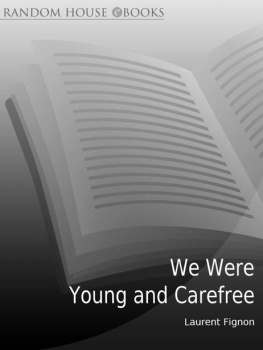BREAKING THE CHAIN
Drugs and Cycling: The True Story
Willy Voet
TRANSLATED BY
WILLIAM FOTHERINGHAM

This ebook is sold subject to the condition that it shall not, by way of trade or otherwise, be lent, resold, hired out or otherwise circulated without the publishers prior consent in any form (including any digital form) other than this in which it is published and without a similar condition including this condition being imposed on the subsequent purchaser.
Epub ISBN: 9781446466179
Version 1.0
www.randomhouse.co.uk
First published by Yellow Jersey Press 2001
10 9
Copyright Calmann-Lvy, 1999
Willy Voet has asserted his right under the Copyright, Designs and Patents Act
1988 to be identified as the author of this work
First published in Great Britain in 2001 by
Yellow Jersey Press
Random House, 20 Vauxhall Bridge Road,
London SW1V 2SA
Random House Australia (Pty) Limited
20 Alfred Street, Milsons Point, Sydney,
New South Wales 2061, Australia
Random House New Zealand Limited
18 Poland Road, Glenfield,
Auckland 10, New Zealand
Random House South Africa (Pty) Limited
Isle of Houghton, Corner of Boundary Road & Carse OGowrie,
Houghton 2198, South Africa
Random House UK Limited Reg. No. 954009
A CIP catalogue record for this book is available from the British Library
ISBN 978 0 224 06117 9
For Bruno, Eric and Nathalie
CONTENTS
TRANSLATORS NOTE
Many observers who watched the Tour de France come to the brink of collapse in July 1998 felt that in future cycling might come to be seen in two eras: before and after the Festina drugs scandal. This is borne out by events since that early morning when a French customs officer put out his arm to wave Willy Voet and his cargo of erythroporetin, growth hormone, testosterone, amphetamines and Belgian mix to the side of the road, so sparking off the saga.
Since then, cycling has come under judicial scrutiny of an intensity which no other sport has ever witnessed, and the succession of investigations, trials, sentences and bans has meant that the results of an entire generation cyclings EPO generation have to be seen in a new light. Unfortunately, yet inevitably, it means that the results of their successors will be met with scepticism by fans and media, who have learned the reality of what they saw in the 1990s, taken it at face value and have no wish to be deceived again.
The judiciary in France, Belgium, Holland, Switzerland and Italy have spread their net wide. French investigations have reached deep down into the ranks of amateur cyclists, touched virtually every team in the country, and, this year, went up as high as the double Tour de France winner Lance Armstrongs United States Postal Service team against whom the allegations of malpractice remain unproven and vehemently denied at the time of writing.
After the marathon investigation sparked off by Voets arrest, he faced trial in Lille in October 2000 with the Festina manager Bruno Roussel, PR manager Jol Chabiron and Richard Virenque. Team doctor Erik Rijckaert was absent due to illness; sadly, he died of lung cancer in late January 2001. Virenques confession that he had indeed used EPO, entirely contrary to the version of events he had given all through the Festina inquiry, led to a tearful courtroom reconciliation with his former soigneur.
It also enabled him to avoid a criminal prosecution, although it earned him a ban from racing, while Voet, Roussel and Chabiron all received suspended prison sentences and fines related to supplying and inciting the use of drugs. The trial further confirmed the extent of cyclings drug problem. Indeed, the verdicts were purposely lenient, said the presiding judge Daniel Delegove, because Festina was not an isolated case.
In Italy, if anything, the inquiries have been even more extensive, following the headline-grabbing morning in June 1999 when their top cyclist Marco Pantani was rumbled. Pantani, the winner, ironically, of the stricken 1998 Tour de France, was found to have blood far thicker than the UCIs limit (a possible sign of EPO use) and was thrown off the Giro dItalia 24 hours from the finish, when his victory had seemed assured.
In an unprecedented case, Pantani was found guilty of sporting fraud for his alleged use of EPO, while a string of the greatest Italian cyclists of the 1990s have been named as receiving drugs during police inquiries into virtually every Italian trainer, including the once-legendary Michele Ferrari, and Francesco Conconi the man paid by the International Olympic Committee to find a test for EPO.
Nearly three years post-Festina, the signs of progress towards a cleaner sport remain mixed. Team helpers such as Voet are now licensed, and have to be properly qualified. Cyclists undergo regular, stringent medical tests to detect any signs of deteriorating health that may be caused by drug use. A test for EPO was used in the Sydney Olympics, and there were hints that this would be more widely adopted.
And yet... Three cyclists were thrown off the 2000 Tour before it had even begun, when they failed the blood test. The avowedly anti-drug cyclist Christophe Bassons was ostracised by his peers and quit the 1999 race a nervous wreck. And there were signs at the end of 2000 that some of the Tours corporate backers Fiat, Coca-Cola, Credit Lyonnais were getting restive.
Events have moved on since Breaking the Chain was published in France in May 1999. But Voets inside view of the ways of cycling leading up to the scandal remains vitally important if we are to understand the pressures which lead sportsmen to take drugs, the lies they tell themselves to justify their drug-taking, and the way in which drug-taking makes a nonsense of the notion of a level sporting playing field.
The arrest of a soigneur on a quiet back road on the Franco-Belgian border has already shaken the sport to its foundations: cycling will never be the same again. Breaking the Chain is part of a process of change which, it is to be hoped, will lead to a cleaner sport: who knows, however, if the links of the chain can be put back together again?
W.F.
London
January 2001
PREFACE
It was not an easy decision to make. Writing a book which tells the truth about the lies in cycling, going through thirty years of silence with a fine-tooth comb, testifying to the reality behind a theatrical spectacle in which I played my part for a long time; believe me, none of this was easy. And now I can expect the sarcastic epithets: the man who shattered dreams, who spat in the soup, who flung mud at a sport of the people. Fair enough: thats how you can see this if you want to pretend nothing is going on, as long as the wheels keep turning. But at what price?
What you are about to read is not motivated by bitterness or a desire for revenge. I am not passing on rumours picked up here and there, but real events which I have lived through. I have been kicking around the world of top-level cycling since 1972; as they say, I have been there, and, modest as I am, eight times out of ten I can recognise who is charging and who isnt. There are little signs, which most people cant pick up.

